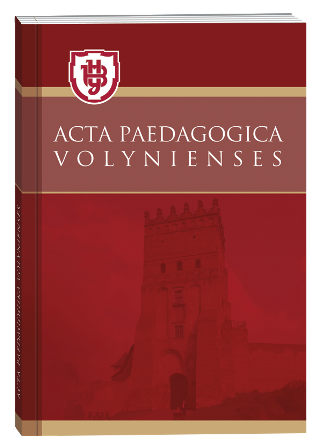TECHNOLOGY FOR FORMING PEDAGOGICAL THINKING IN FUTURE PRESCHOOL EDUCATORS BASED ON THE USE OF EDUCATIONAL TEXTS
DOI:
https://doi.org/10.32782/apv/2024.5.2Keywords:
humanistic practices of professional training, future preschool teachers, hermeneutic approach, pedagogical hermeneutics, technologies of working with textAbstract
The article is devoted to the implementation of a hermeneutic approach in the process of professional training of future preschool teachers, which involves the use of specially selected pedagogical texts during the teaching of professional disciplines, work with which allows students to feel and comprehend the essence of abstract concepts and categories that are difficult to understand, and learn to analyze pedagogical situations. Algorithms for organizing work in the process of studying professional disciplines with bachelor’s and master’s degree applicants are presented, analytical and constructive tasks based on the content of the text are characterized. The use of specially selected texts in the process of studying professional disciplines, which present various situations of interpersonal interaction and work with them through the prism of communication, dialogues of subjects, that is, intersubjective connections and relationships in general, is oriented towards the implementation of the paradigm of “pedagogy of understanding”, which generates professional consciousness and thinking, ability, readiness for understanding. Scientists, supporters of the hermaneutic approach, agree on the definition of the special role of the text as the basis for the formation of a multi-level mechanism of understanding. And for the professional growth of future preschool teachers, the essence, content and structure of the process of interpreting pedagogical knowledge are especially significant as a means and method of mastering the language of pedagogy by students as a translator of the meanings and meanings of its main categories. Reflection, reflective thinking in the format of problem dialogues on the material of specially selected texts as a tool of cognition ensures the conscious acceptance by students of basic pedagogical truths, the formation of their own model of professional behavior. The technology of compiling a pedagogical outline and the technology of formulating pedagogical maxims are described. The positive role in optimizing the process of assimilation of educational information by students of various methods of artistic and creative activity based on texts for the formation of pedagogical thinking has been confirmed, in particular, the composition of quatrains (quatrains are figurative quatrains on a given topic), the symbolic definition of one’s pedagogical credo, the development of a pedagogical logo (a kind of graphic emblem or symbol) and other graphic products of project and creative activity (posters, slide shows, videos, newspapers, almanacs, etc.), etc.
References
Бацевич Ф. Основи комунікативної лінгвістики: підручник. 2-ге вид., доп. К. : ВЦ «Академія», Серія «Альма-матер». 2009. 376 с.
Бєлєнька Г., Половіна О., Кондратець І., Шинкар Т. Формування професійної компетентності магістрів дошкільної освіти : посібник до сучасного Освітологічного дискурсу (3(34)). 2021. С. 96–110.
Кремінь В. У пошуках філософсько-антропологічних смислів і ціннісних пріоритетів освіти. Голос України, 2017, № 115.
Гавриш Н., Барна Х., Половіна О. Осердечення змісту професійної підготовки як чинник особистісно-професійного зростання майбутніх педагогів дошкільної освіти. Science and Education a New Dimension. Pedagogy and Psychology, IV (45), Budapest, Issue : 93, 2016 www.seanewdim.com. С. 42–46.
Гавриш Н. Формування основ педагогічного мислення у майбутніх вихователів закладів дошкільної освіти. Забезпечення якісної підготовки майбутніх фахівців дошкільної освіти в процесі використання сучасних технологій: зб. наук. праць / За заг.ред Л.В.Зданевич. Хмельницький : ХГПА, 2018. С. 56–64.
Гарага В. Концептуальні основи педагогічної герменевтики [Електронний ресурс]. Молодь і ринок. 2014. № 4. С. 159–162. Режим доступу : http://nbuv.gov.ua/UJRN/Mir_2014_4_36.
Жаровцева Т. Рефлексія в педагогічній діяльності майбутнього фахівця дошкільної освіти. Наук. вісн. Пд.-укр. пед. університету. О., 2002. Вип. 10.
Желанова В. В. Наукові підходи у дослідженні феномену контекстного навчання майбутнього вчителя початкових класів. Проблеми сучасної педагогічної освіти. Педагогіка і психологія. 2013. Вип. 39(1). С. 193–199. Режим доступу : http://nbuv.gov.ua/UJRN/pspo_2013_39(1)__32.
Желанова В. Середовищний підхід у вищій освіті: сутність та логіка реалізації. Теорія і практика професійної майстерності в умовах цілежиттєвого навчання: Монографія. АМСКП» Полісся», 2016. С.98–115.
Інноваційні технології навчання і виховання: навчальна програма для студентів денної та заочної форм навчання ОКР «магістр» спеціальності «Початкове навчання» / Укладачі: Г. Тарасенко, О. Голюк, Вінниця: ВДПУ, 2010. 108 с.
Кучерявий О. Педагогіка: особистісно-розвивальні аспекти : навчальний посібник для студ. вищ. навч. закл. Київ : Слово, 2014. 436 с.
Кучерявий О. Якість педагогічної освіти, тенденції і перспективи: навчал. Посібник. К. : Талком, 2019. 192 с.
Ліненко А. Місце та роль педагогічної герменевтики в освіті https://enpuir.npu.edu.ua/bitstream/handle/123456789/6934/Garaga.pdf?sequence=1
Пєхота О. Технології педагогічної освіти: мета, зміст, особливості застосування у сучасних умовах. Науковий вісник Миколаївського національного університету імені В. О. Сухомлинського. Серія : Педагогічні науки. 2013. Вип. 1.40. С. 26–31. Режим доступу : http://nbuv.gov.ua/UJRN/Nvmdup_2013_1.
Рябовол Т. Роль емпатії у процесі соціальної адаптації. Наукові записки Інституту психології ім. Г. С. Костюка АПН України. Випуск 24. К., 2004. С. 294–300.
Танько Т. Духовно-моральні цінності як ознака професіоналізму вихователя сучасного закладу дошкільної освіти. Освітній простір України. Вип.13. 2018. С. 126–132.
Тарасенко Г. Проблема гуманітаризації освітнього простору в контексті наукових ідей Семена Гончаренка (до 90-річчя з дня народження видатного українського педагога). Український педагогічний журнал. 2018. № 1. С. 6–14.
Фурман А. Біциклічна модель організації процесів розуміння. Вітакультурний млин. 2008. Модуль 8. С. 4–12.
Фурман А. Ідея професійного методологування: Монографія. Ялта-Тернопіль : Економічна думка, 2008. 205 с.
Grice H. Logic and Conversation. Syntax and Semantics / еd. by P. Cole, J. Morgan. N. Y. : Academic Press, 1975. Vol. № 3. P. 41–58.







